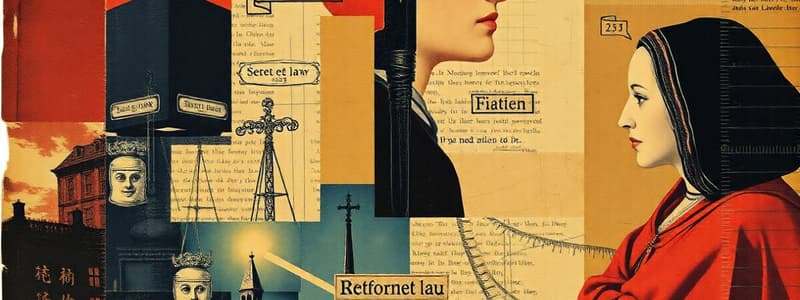Podcast
Questions and Answers
What contributed to the transition from Medieval Latin to vernacular languages in legal contexts?
What contributed to the transition from Medieval Latin to vernacular languages in legal contexts?
- The establishment of Latin as the sole legal language across Europe
- The gradual emergence of national identity and languages (correct)
- The expansion of the Roman Empire into diverse regions
- The introduction of classical literature in legal education
Which statement about Medieval Latin is correct?
Which statement about Medieval Latin is correct?
- It was preserved through formal education and was a lingua franca. (correct)
- It completely replaced the use of vulgar languages in legal contexts.
- It was a spoken language primarily at homes and in casual settings.
- It was exclusively used by the common people in Europe.
What role did the Synod of Tours (813) play in the evolution of legal language?
What role did the Synod of Tours (813) play in the evolution of legal language?
- It encouraged the use of vernacular languages for communication with the public. (correct)
- It sought to eradicate vulgar languages from church sermons.
- It mandated the exclusive use of Latin for all legal proceedings.
- It established Latin as the foundation for all Romance languages.
What was the significance of the Oaths of Strasbourg (842)?
What was the significance of the Oaths of Strasbourg (842)?
Which of the following best describes the relationship between Classical and Vulgar Latin?
Which of the following best describes the relationship between Classical and Vulgar Latin?
How did the Carolingian reforms aim to affect Latin?
How did the Carolingian reforms aim to affect Latin?
What was a major effect of the fragmentation of the Roman Empire on language?
What was a major effect of the fragmentation of the Roman Empire on language?
Which of the following statements reflects the complexity of legal multilingualism?
Which of the following statements reflects the complexity of legal multilingualism?
What role did Latin play in the documentation of Germanic laws?
What role did Latin play in the documentation of Germanic laws?
Which document is an example of Lombard laws written in Latin?
Which document is an example of Lombard laws written in Latin?
What was a major challenge in translating Lombard laws into Latin?
What was a major challenge in translating Lombard laws into Latin?
What was one role of notaries in the medieval legal system?
What was one role of notaries in the medieval legal system?
How did the Ordonnance of Villers-Cotterêts (1539) impact the use of language in legal proceedings?
How did the Ordonnance of Villers-Cotterêts (1539) impact the use of language in legal proceedings?
What was the effect of bilingualism in medieval legal proceedings?
What was the effect of bilingualism in medieval legal proceedings?
What was a key term in Lombard legal traditions that maintained its original form when translated into Latin?
What was a key term in Lombard legal traditions that maintained its original form when translated into Latin?
How did notaries develop their translation strategies for legal documents?
How did notaries develop their translation strategies for legal documents?
What marked the transition of legal practice from Latin to vulgar languages in the 16th century?
What marked the transition of legal practice from Latin to vulgar languages in the 16th century?
Flashcards
Legal Language
Legal Language
A language used for legal purposes.
Medieval Latin
Medieval Latin
The common language used throughout Europe during the Middle Ages.
Vulgar Latin
Vulgar Latin
The spoken language of ordinary people in the Roman Empire.
Latin Bifurcation
Latin Bifurcation
Signup and view all the flashcards
Romance Languages
Romance Languages
Signup and view all the flashcards
Latin Revival
Latin Revival
Signup and view all the flashcards
Rise of Vernaculars
Rise of Vernaculars
Signup and view all the flashcards
Legal Bilingualism
Legal Bilingualism
Signup and view all the flashcards
Germanic Legislation: Oral to Written
Germanic Legislation: Oral to Written
Signup and view all the flashcards
Notaries and Clerics
Notaries and Clerics
Signup and view all the flashcards
Lombard Legal Language
Lombard Legal Language
Signup and view all the flashcards
Key Terms in Lombard Law
Key Terms in Lombard Law
Signup and view all the flashcards
Notaries and Translations
Notaries and Translations
Signup and view all the flashcards
Notarial Formularies
Notarial Formularies
Signup and view all the flashcards
Language of Proceedings
Language of Proceedings
Signup and view all the flashcards
Germanic vs. Roman-Canonical Trials
Germanic vs. Roman-Canonical Trials
Signup and view all the flashcards
Shift to Vulgar Languages
Shift to Vulgar Languages
Signup and view all the flashcards
Study Notes
Languages of Law in Medieval Europe
- European legal systems, though sharing a heritage, display diverse linguistic characteristics stemming from varied geographic, cultural, and historical contexts.
- Latin, dominant during the medieval period, gradually faced competition from vernacular languages.
- This multilingualism, or "legal bilingualism," persisted through the 18th century, characterized by a complex interplay between Latin and vernaculars.
- The study of legal language is interdisciplinary, encompassing law, linguistics, and cultural history.
Medieval Latin and Vernaculars
- Medieval Latin served as a lingua franca, influenced by classical and vulgar Latin, and ecclesiastical traditions.
- It was a language primarily used in writing and education, less so in family settings.
- Latin’s precise legal vocabulary drew from existing concepts and incorporated contemporary terms ensuring clarity.
- Latin split into Classical and Vulgar (spoken) forms during Late Antiquity. Vulgar Latin evolved from regional influences post-Roman Empire.
- After the Roman Empire’s fragmentation, linguistic diversity grew alongside territorial divisions.
- Vulgar Latin became the base for Romance languages in certain areas.
- The Carolingian reforms, while seeking Latin purity, acknowledged the continued divergence of vernaculars.
- Documents like the Oaths of Strasbourg (842) demonstrated the integration of vernacular languages into public records, although Latin remained dominant for official legal texts.
Germanic Legislation
- Germanic peoples, post-Roman empire, had oral customary laws bound to tribal identities.
- These laws, applying to people rather than territory, were preserved orally.
- Germanic laws began to be recorded in Latin as the language of Roman civilization.
- Latinization relied on notaries and clerics, often leading to variations in grammar and syntax.
- This process represented a fusion of Germanic and Roman cultural influences.
Lombard Legal Language
- The Lombards' legal traditions, recorded in Latin (Edict of Rothari, 643), demonstrated a unique linguistic challenge.
- Lombard terms like faida (vendetta) and wegworin (road blockage) were translated into Latin or explained alongside Latin equivalents.
- Difficulty in translating the Lombard oral traditions' poetic, alliterative structure resulted in hybrid forms of language.
Notaries and Translations
- Notaries played a crucial mediating role, translating vulgar languages into Latin for legal documents, ensuring clarity and precision.
- Notarial formularies standardized legal documentation.
- The shift from Latin to vernacular languages in notarial practice began by the 16th century (e.g. France’s Ordonnance of Villers-Cotterêts, 1539).
Language of Proceedings
- Latin remained the dominant language for records and judgments in trials, but vernacular languages were used by witnesses.
- Early Germanic trials relied on oral oaths and accusations.
- Roman-Canonical trials emphasized written records and inquisitorial procedures, strengthening Latin.
- Gradually, vernacular languages were used in witness testimonies and local records with Latin persisting into the 18th century.
Studying That Suits You
Use AI to generate personalized quizzes and flashcards to suit your learning preferences.
Description
Explore the evolution of legal language in medieval Europe, focusing on the competition between Latin and vernacular languages. This quiz delves into the historical and cultural contexts that shaped multilingual legal systems, revealing the interdisciplinary nature of law, linguistics, and cultural history.




